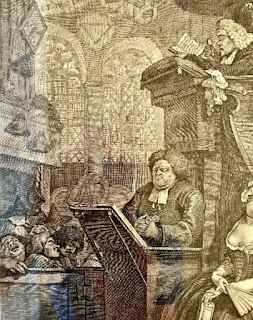Special Coronavirus Issue of “Friends of St. Paul”
With a tilt toward humor and wisdom from an expert
The humor – Be sure to “load all images,” and you will have before you the satirical wit of the keen observer of the church, William Hogarth. Details at the bottom.
The expert for this issue is Epaphras, church planter of Colossae, Laodicea, and Hieropolis.
The References: Col. 1:7 You understood the grace of God from Epaphras.
Col. 4:12 Epaphras struggles on behalf of you through prayer.
The story that emerges:
In the years 52-55 when Paul was in Ephesus, one of the men he discipled was Epaphras. He came from Colossae and began the church there, as well as the churches in Laodicea and Hieropolis. These cities were in the Lycus Valley, about 75 miles from Ephesus.
Paul opens his letter to the Colossians describing the spiritual condition of the Christians in Colossae. These were “love for all the saints,” “hope laid up in heaven,” and “knowing the grace of God in truth” (Col. 1:4, 5, 6). But that was not what Epaphras found in his valley. He worked in a population that was largely pagans, motivated by greed, self-preservation, fear of death, and hostility to the Christian gospel.
Somehow Epaphras brought the Holy Spirit’s power in ways that overcame the staunchest resistance of the inhabitants of the Lycos Valley.
Maybe this man has some wisdom for us living under the shadow of the coronavirus.
The moment he joined me on the heavenly bench, I sensed his compassion towards what we are living with. (I did ask him if he had used hand sanitizer before sitting down. He just rolled his eyes. I get it. So we didn’t bot her with the six feet of social distancing.)
He asked about how things are going. I mentioned two things. First, we wash our hands while singing “Happy Birthday” twice, though I doubt if any get all the way through the second time. Second, I told him that my sisters and I were setting up a virtual dinner party for the six of us. This will be challenging since one of us has given up the grape for Lent and another is vegetarian. “Sounds weird,” was his comment. I asked how come he knew my sisters so well!
I went on to report that churches are relying on services online, and the prevailing message is to trust God in this crisis. But, I observed, there could be little resemblance to his three cities and their pagan environment.
“Quite the contrary,” he said, and moved into some lessons that bridge the time and culture.
There is opportunity, he assured me, but it will only come with the effort to recast our imagination. Well, that phrase intrigued me and made me listen closely. He went on to point to three similarities: the house church, love for the saints, and showing hope.
The “church” we read about in Colossae met in the home of Nympha (Col. 4:15). That made it no different from the virtual groups that meet today. This reduced size of congregations need be no impediment to fellowship and community. If you can have your virtual dinner party, then you can have virtual groups that meet for other reasons. Bible studies are obvious ones, and AA. But why not virtual groups of walkers, virtual meetings over coffee, follow up patio conversations, as well visits with elderly who are alone. None of these requires social distancing. Take it from there in your imagination.
As for “the love in the hearts of Christians,” discard the silly “Happy Birthday” song; instead while you are washing, recite these three Beatitudes:
“Blessed are those who mourn, for they shall be comforted.
Blessed are the peacemakers, for they shall be called children of God.
Blessed are the merciful, for they shall obtain mercy.”
That’s not quite the 20 seconds, but they need a pause afterwards. That is when you reflect on the people who come to mind, the needs that they live with, and the ways that you can touch them. You will see friends long forgotten, lonely neighbors, sick people on prayer lists, and masses who come to us only by generalizations. Examples of these would be the 900,000 Libyans forced to shelter in schools and temporary centers; the 20,000 refugees on Lesvos of Greece; the prison populations, and – well, back to your imagination.
“The hope that is alive in Christians” goes much further than trusting that God is in charge. It frees us to acts of love that stand in contrast to feelings of abandonment, hearts that have shut down, motivations of self-preservation, fear of the future, anxiety in the present. Hope lets us visit and return, listen and pray, show sacrificial kindness, speak peace to despair, and explain “what is laid up for us in heaven.”
Epaphras reminded us of one more thing that Paul wrote about him – how he “agonized” in prayer over his people. If prayer dries up, our love will diminish and our hope disappear.
The opportunity is to put on the best show in town, highly valued now and remembered later. And at the center of the show is the one who is the source of hope and love, Jesus Christ.
The Hogarth print I stashed away for myself to keep from other interested clergy in the family. That would be “PK,” preacher’s kid (1), brother-in-law (1), nephew (3), and first cousin (3). You got it—the family business. But I have the Hogarth.

No comments:
Post a Comment